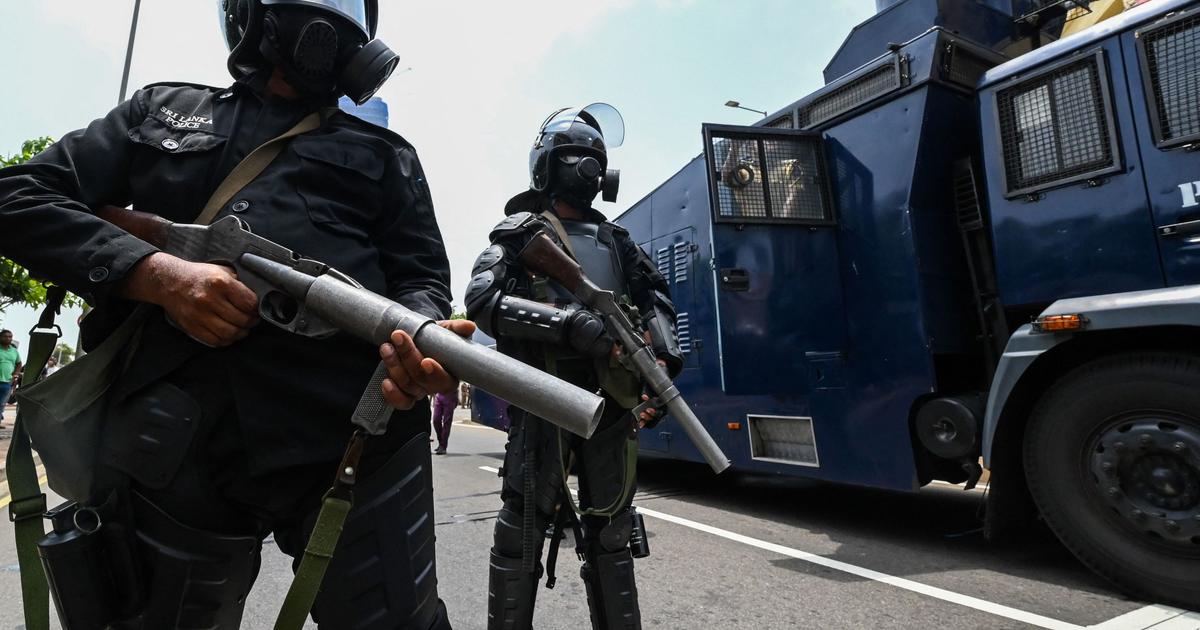Thousands of soldiers and police were deployed to Sri Lanka on Tuesday (May 9th) to enforce the curfew, the day after Prime Minister Mahinda Rajapaksa resigned following deadly clashes between his supporters and protesters anti-government, in the island in the grip of a historic economic crisis.
To discover
LIVE - War in Ukraine: follow minute by minute the evolution of the conflict
Read alsoSri Lanka on the brink
The country of 22 million people has been facing protests for several weeks calling for the resignation of the Rajapaksa government after months of shortages of food, fuel and medicine marking the most serious economic crisis since its independence in 1948. The army exfiltrated the former prime minister early Tuesday from his official residence in Colombo, to place him in safety after thousands of demonstrators forced one of the gates.
"
After an operation carried out before dawn, the former prime minister and his family were evacuated to a safe place by the army
," a senior security official told AFP.
Incendiary bombs
After breaking through the main gate of Mahinda Rajapaksa's
Temple Trees
residence in Colombo, protesters attempted to storm the two-story main building where President Gotabaya Rajapaksa's brother had taken refuge with his family.
"
At least 10 incendiary bombs were thrown into the complex
," the senior official said.
Dozens of homes belonging to Rajapaksa supporters have been burned elsewhere in the country, where a state of emergency and a curfew are in effect.
Also according to the senior official, the police used a wall of tear gas and fired warning shots in the air to prevent the crowd from passing the three entrances to the colonial-era complex, a key symbol of the power of the state.
Mahinda in a safe place
Sri Lankan protesters and religious leaders have blamed Mahinda Rajapaksa for inciting family clan supporters to spark Monday's clashes that left five people dead and nearly 200 injured, the deadliest day since a crackdown on an anti-government demonstration on April 19 in the center of the country (one dead, 24 injured).
The former prime minister, who resigned following the violence, is now safe in an undisclosed location.
Read alsoSri Lanka: the Rajapaksa brothers extend their influence
On Monday, in Nittambuwa, about 50 kilometers north of the capital, a ruling party MP, Amarakeerthi Athukorala, killed himself after opening fire on two anti-government protesters who were blocking his car.
One of the two victims, aged 27, has since succumbed to his injuries, and the MP's bodyguard has been found dead.
Two other people were killed in the city of Weeraketiya (South), by a member of the ruling party shooting at protesters.
Doctors at the main national hospital in Colombo greeted the influx of injured people, including government supporters helped to access the emergency room by the army who forced a barrage of protesters at the entrance.
Gotabaya still in control
“
They may be murderers, but for us they are patients who need to be treated first
,” a doctor shouted at a crowd blocking the emergency department.
President Gotabaya Rajapaksa remains in office, enjoying sweeping powers and command of the security forces.
Even with a coalition government, the president will be able to appoint and remove ministers as well as judges, and enjoy immunity.
"
If President Rajapaksa does not stand down, no one, be it the crowds in the streets or the main political players, will be appeased
," analyst Michael Kugelman of the US think tank Wilson Center told AFP.
Read alsoThe Covid triggers a food crisis in Sri Lanka
For Akhil Bery of the Asia Society Policy Institute, it is difficult to anticipate President Rajapaksa's conduct in the face of the challenge.
He could either resign, or appoint an interim government and then resign, or repress the demonstrations, or wait for them to "
calm down naturally
", Akhil Bery told AFP.
But no matter what, the next government will have to make "
unpopular decisions
" to fix the crumbling economy, he added.
Any bailout by the International Monetary Fund (IMF), currently under negotiation, would mean “
raised taxes and lower government spending, which is a politically toxic combination
.”

